Positive Activities For Young People Evaluation Report 2022
Headlines
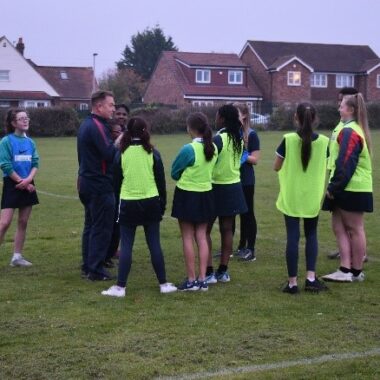
Co-creating activities with young people is a crucial factor to increase the likelihood of them engaging with sport and physical activity
There was an increase in activity levels after students started taking part in the after-school sessions
Over 50% of young people reported an increase in physical literacy
Over 50% of young people stated that their resilience and self-belief improved since taking part in the activities
The least active young people’s happiness and life satisfaction increased following their participation in the co-created activities
Young people are likely to continue to attend after-school sessions or form a habit of physical activity
Introduction
Research from leading national bodies such as Sport England, Youth Sports Trust and StreetGames, has found that co-creating activities with young people is a crucial factor to increase the likelihood of them engaging with sport and physical activity.
To support this research, during the 2021/22 academic year, Active Kent & Medway worked closely with secondary schools and School Games Organisers (SGOs) to develop activities based on the needs of the least active young people (those doing less than an average of 30 minutes of physical activity per day).
An initial survey was carried out with over 2000 students from 28 schools across Kent and Medway to understand the least active young people’s likes, dislikes and motivations towards physical activity and school sport, as well as finding out about the activities they would like to try.
The survey also asked which qualities students look for in a PE teacher or coach, and what might make them attend after-school clubs.
Active Kent & Medway provided a report for each school with a summary of their students’ responses to influence session planning of both teachers and coaches.
Co-creating and delivering the after-school activities
Schools who took part in the initial survey were awarded funding from Active Kent & Medway’s Positive Activities for Young People grant to deliver the most voted for activities from the least active students.
Active Kent & Medway worked with SGOs to support schools with their project planning, including linking with community organisations to deliver chosen activities for up to 18 weeks. Some schools delivered one club, while others delivered up to three different activities.
At the end of the 18 weeks, Active Kent & Medway undertook the participation evaluation survey to assess the impact the co-creation approach had on the young people and the activities that followed.
The evaluation survey sought to explore if there were any changes in activity levels and attitudes towards being active in comparison to the initial survey which took place earlier in the year.
Survey Findings
Young people's activity levels per day before and after taking part in the after-school sessions
0-29 mins. per day
30-59 mins. per day
60 mins. + per day
Activity Levels
- There was an 18% increase in the number of active young people meeting the Chief Medical Officer’s guidelines of an average of 60 minutes per day.
- There was a 17% decrease in the number of less active young people who were achieving less than 30 minutes per day.
Physical Literacy Levels
Physical literacy is described as ‘the motivation, confidence, physical competence, understanding and knowledge to value and take responsibility for engagement in physical activities for life’. This is a concept that correlates with the likelihood of someone being active or not.
Over 50% of young people reported an increase to all five elements of the physical literacy-based questions:
- My enjoyment of taking part in exercise and sport
- My confidence when I exercise and play sports
- How easy I find exercise and sport
- My understanding of why exercise and sports are good for me
- Knowing how to get involved and improve my skills in lots of different types of exercise and sport
Resilience and Self-Belief
- Over 50% of young people stated that their resilience and self-belief improved since taking part in the after school activities.
- The percentage of young people who were the least active and stated they “enjoy taking part in physical activity a lot” increased by over 7%.
- Those young people who said they “enjoy taking part in physical activity not very much” decreased by over 7%.
Perceived happiness and life satisfaction scores of least active young people before and after taking part in after-school sessions (1 = lowest, 10 = highest)
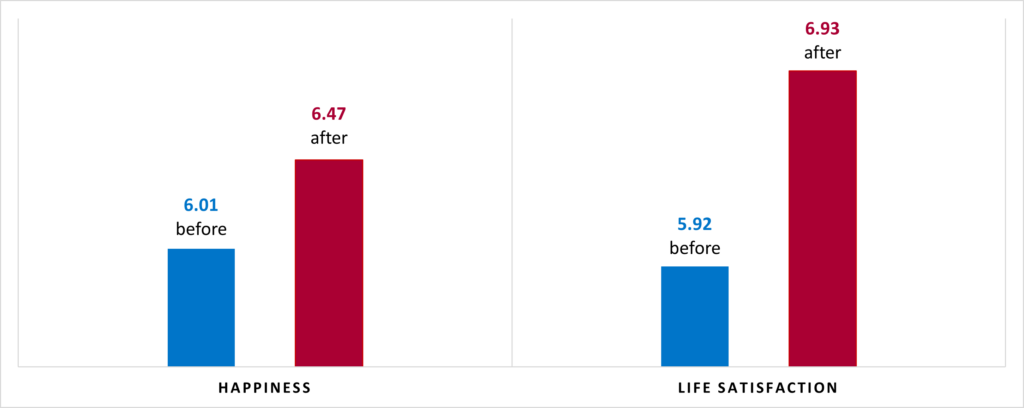
Happiness and Life Satisfaction
- Young people were happier and more satisfied with their lives after taking part in the after-school sessions.
- Young people reported an average increase of 1.01 out of 10 for how satisfied they were with their lives.
Participant Feedback
What do you like about after-school clubs?
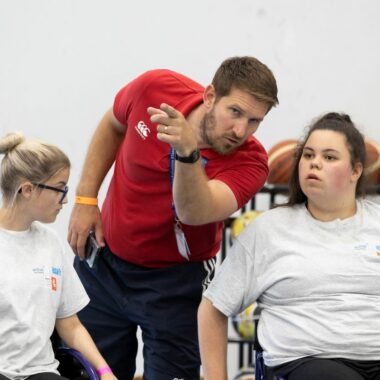
It gives you an opportunity to relax but still have fun after the school day
I like spending more time with my friends and improving
They can be fun and exciting and a great opportunity to learn something new I enjoy
New experiences and open mind to new things
What do you dislike about after-school clubs?
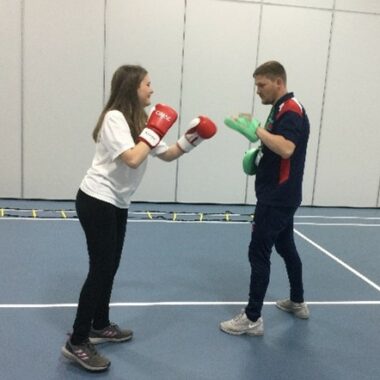
Sometimes it feels like some of the activities go on for ages but they don't really
After some time the sports can get boring
It can be demanding when I have had a very long and tiring day at school
Sorting transport to get home
How do you feel after doing physical activity at your after-school club?
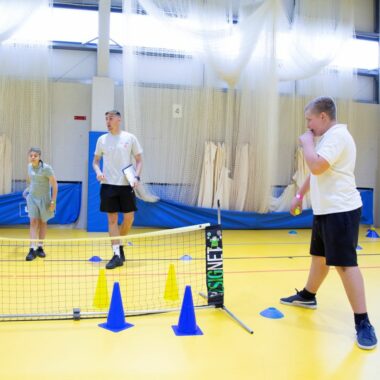
I feel tired but happy about myself that I had the belief to go
I feel much more confident
Much better than before I had done exercise
Very good because it is doing my body good
PE Teacher Feedback
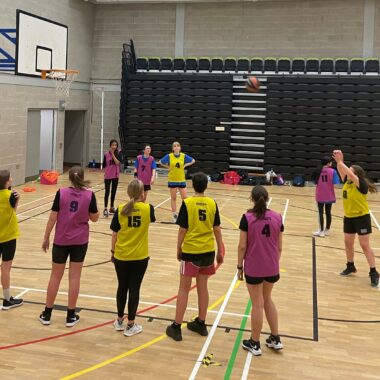
“This opportunity has increased the physical activity levels and behaviour of students, along with their commitment and resilience towards an after-school activity.” Marsh Academy
“We especially had good feedback from teachers regarding pupils’ engagement in lesson, knowing they had boxing club at lunch time. This really did attract our students who struggle to make positive behaviour choices.” Hillview School for Girls
“We have seen a better approach to behaviour in lessons, with children noticing that there is an avenue for them to participate.” Rainham School for Girls
Recommendations
How to engage your least active students in after-school clubs:
1. Always give young people the chance to co-create sessions and programmes.
This can be achieved through a variety of methods such as surveys, focus groups, graffiti walls, or informal conversations with young people when developing new programmes.
2. Encourage ‘youth voice’ as an ongoing ethos of the programme.
As well as asking about the types of sport or activity at the beginning of each session, ask young people what they would like to do and have achieved at the end. Can you encourage the young people to lead part of the session themselves by asking them to create a new warm up activity?
3. Ensure that young people’s motivation, confidence, physical competence, understanding, and knowledge is being developed during sessions.
When writing your session plans, include a key to highlight to yourself where these components are being developed, for example, M means Motivation, C means Confidence etc. Come up with fun games or quizzes that specifically reference these terms.
4. Create a welcoming and inclusive environment for all.
Buddies and ice breakers could make new participants and those who haven’t attended recently feel more relaxed. For example, ask everyone to introduce themselves along with their favourite food, song or film. Ask new participants if they would like to select the music playlist for that session too.
5. Promote the mental wellbeing benefits as much as the physical benefits of physical activity.
Consider using messages in your promotional material that mention how you feel, for example, ‘Join in and feel great’, ‘Move to be happy’, ‘Feeling tired? Get active to boost your energy’. Most importantly, regularly ask participants “How are you feeling today?”, and don’t be afraid to ask twice.
Next Steps
To ensure the sustainability of the projects, the schools are looking at ways they can continue to deliver by:
- Training up staff and young leaders to deliver sessions
- Developing exit routes with community organisations
- Working with partners to develop training opportunities
- Using the findings to influence senior leaders to prioritise and invest in PE and sport
Contact Us
If you would like to link with local community organisations or schools, or you’re interested in utilising our survey findings to co-create activities with young people, please contact Daniel Bromley, our Club and Schools Development Officer, email: Daniel.bromley@kent.gov.uk

